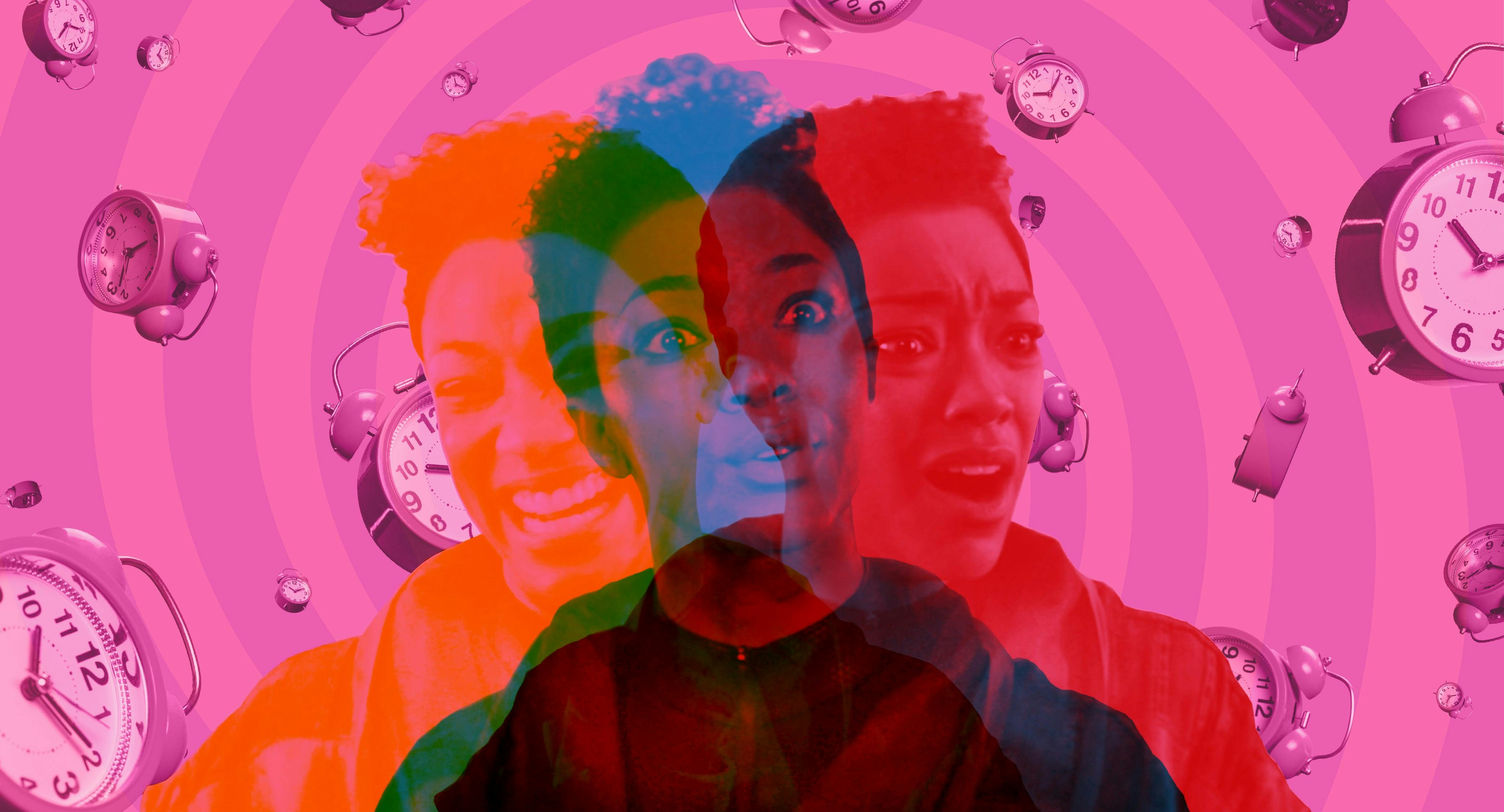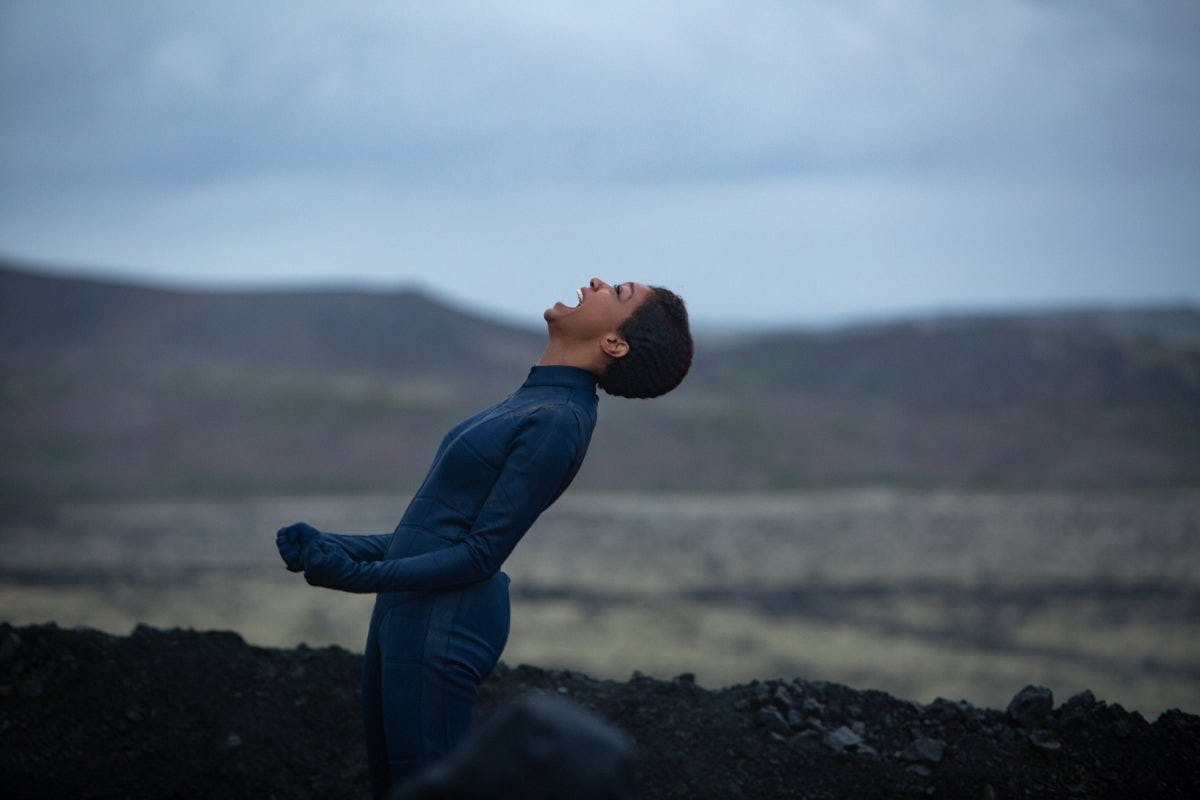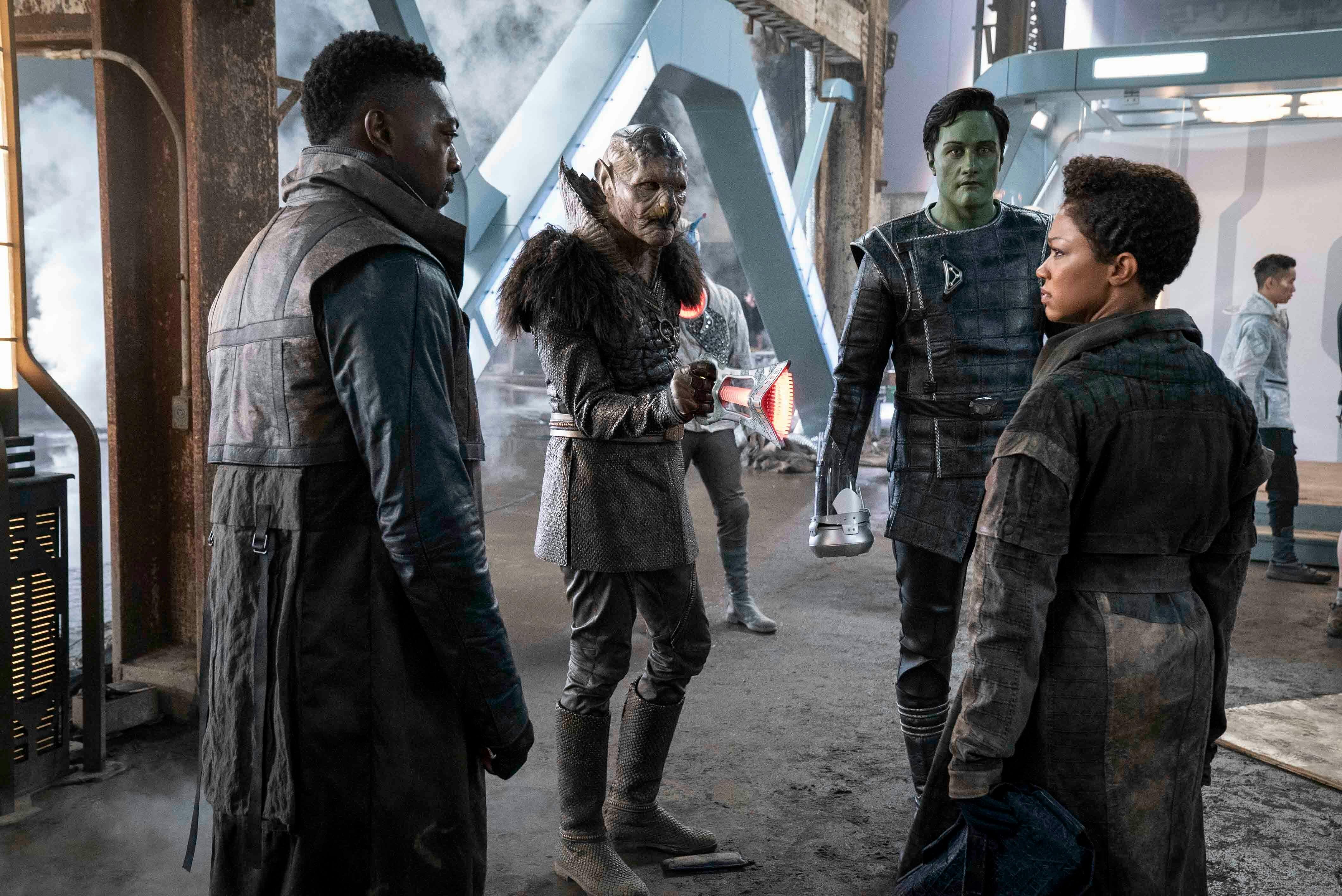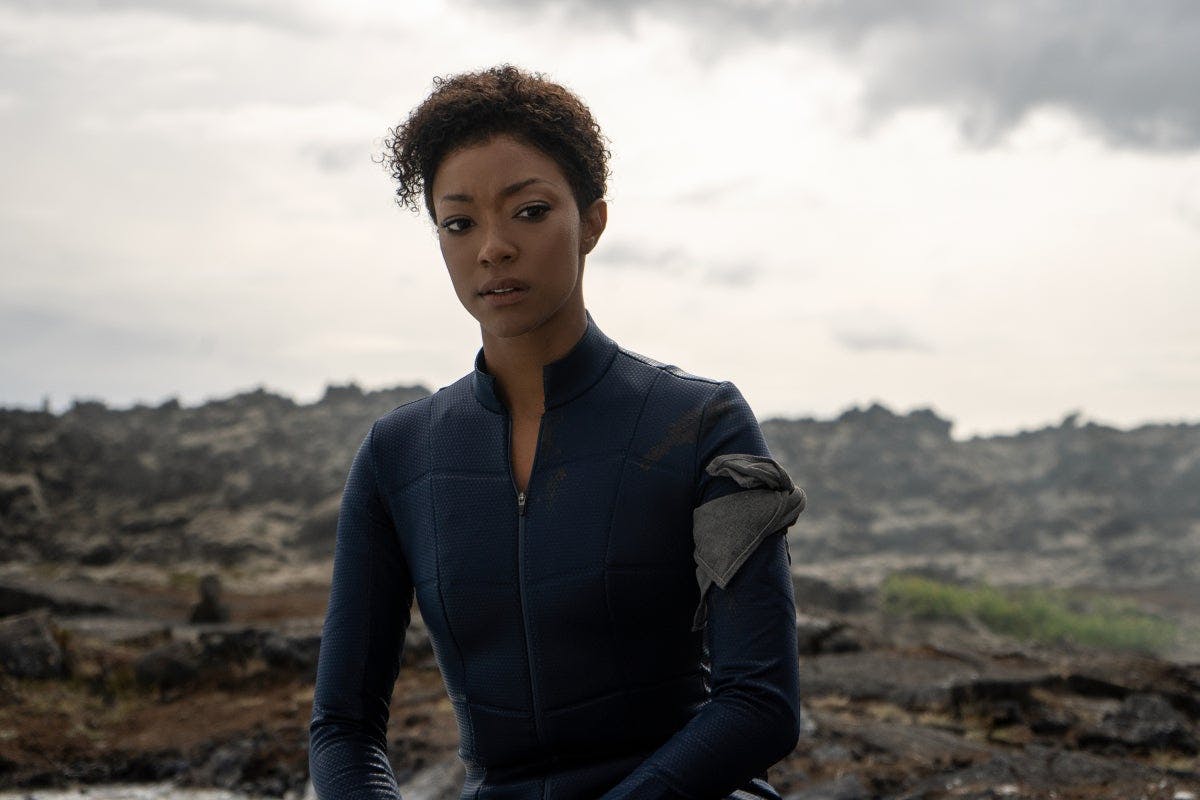Published Oct 29, 2020
Time Travel is Freaking Us All Out — Here's What to Do About It
Who among us hasn’t traveled 900 years this year?

StarTrek.com | Getty Images
You haven’t been eaten and then spit out by an endangered space worm at the end of a long day of time travel, trust, and betrayal. You haven’t tried to reconcile new realities, shattered norms, and buddy-teleporting with men you’ve justifiably punched who have unusually large cats you’d like to pet.
But also, yes... you have.
“In a lot of ways, [the beginning of Discovery Season 3] mirrors what we’ve gone through this year,” says Dr. Ali Mattu, a Star Trek fan and clinical psychologist who specializes in anxiety disorders.
This year, Mattu says, symptoms that would normally require intervention — hypervigilance, obsessions — are part of everyday life. “Everyone now has a mental health story because of 2020.”
He saw a lot of that in Michael Burnham’s journey in “That Hope Is You, Part 1,” starting with the moment she digs herself out after impact. “She’s really in a state of crisis. She’s trying to figure out where she is, when she is, what’s happened,” Mattu says.

StarTrek.com
She’s in fight-or-flight right from the start — flight then fight, really, because she gets in an immediate dust-up with the man we come to know as Book. And then, nearly as quickly, she makes herself incredibly vulnerable to him.
“Sometimes when we’re in a dangerous situation, instead of trying to flee, or instead of fighting, or freezing — which is another fear response — we move to ‘tend and befriend,’” Mattu says. This stress response was named just 20 years ago, and it’s what it sounds like: banding together and looking out for one another in tough times.
He points out that this year many people have responded to stress by supporting others, whether it’s helping elderly neighbors with groceries so they don’t have to put themselves at risk of infection, or taking to the streets to protest for racial justice on behalf of themselves, friends, family or people they’ve never met.
“For Michael Burnham, cooperation, help, and support are sacred values [psychologically],”, he says. “To befriend someone else who might be in danger. In the grand scheme of things, when those in the Federation are facing danger, the Federation values push toward tend and befriend, push toward cooperation.”
Later, Burnham is interrogated by an Andorian and Orion prison guard duo with a squabbling married-couple vibe. They resort to drugging her, totally stopping her forward momentum in the plot and plunging her deep into babbling candor.

StarTrek.com
The moment is played and shot for comedy (“Damn!”) but the reason it’s so deeply funny and relatable — and this is through really great, careful work by Sonequa Martin-Green, director Olatunde Osunsanmi, and writers Michelle Paradise, Jenny Lumet, Alex Kurtzman — is that Burnham’s narcotic-induced honesty turns inward, her personal epiphanies incongruent with the big, shiny stakes of the scene and episode, but right at the heart of the true stakes for Burnham’s series-long character arc.
Orion guard: How are you connected to the Federation?
Burnham: I’m dying to talk about it, I’m dying to talk about it. Because today does not happen to people -- ever. I might be angry about it. I’m supportive, I mean I’m so supportive, I am reflexively supportive, and what is that about? I’m overcompensating. I’ve gotta talk to someone, you need to sit. Can you sit? It’s a super-cool story, it’s just in a completely devastating way. Ha!
It’s an astonishing relief, as a breakthrough for her as a character and as a tension-release device for us as viewers.
“We haven’t had many opportunities to drop our guard,” Mattu says. In the old world, he says, a lot of our opportunities to do that were in acts like returning home after a long day. But for a lot of us, our long days now take place at home. Or maybe, pre-pandemic, we’d go blow off steam with some friends. But we can’t go be with friends all that much right now. Even if we do, maybe we have different levels of comfort and caution regarding COVID-19.
“It’s very difficult to rest, relax, and connect with other people right now,” says Mattu. “And the ways to do that are highly stressful.”
Dammit, Jim, I’m a science officer, not a doctor

StarTrek.com
There are a few tools to keep in the little pack at the back of your winged time-travel suit, starting with what Mattu calls psychological first-aid Á the psych version of putting pressure on bleeding for someone else. He says in a year like this, we all need to know this stuff.
Step one: Safety and stability. “Help the person get out of immediate danger. Help them to feel safe. Help them feel comfort and support. Do they need food? Do they need water? You’d be surprised the number of times someone is going through a tough situation and they are dehydrated or they haven’t eaten all day because they are stressed about something that is happening in their life.”
Step two: Information -- provide some, if possible. “We all went through this with COVID-19: ‘What is it? How is it transmitted? What’s my risk? Is it on surfaces? Do I have to wear a mask? Is it airborne?’ We didn’t have a lot of that in the beginning.” Mattu says Burnham exhibits some of this urgent need for information when she demands to know what the Burn was, and more details about the fate of the Federation.
Step three: Help find social connections. “Michael doesn’t have that in episode one. She’s looking for Discovery and she can’t find them, but she does get social connection with one person who is connected to the Federation, who is connected to her home, to her values. That’s something we all need in these crisis situations.”
Dammit, Jim, I’m a patient, not a doctor

StarTrek.com
As for ways to navigate this nasty subspace anomaly for ourselves, Mattu offers a couple of basic self-care recommendations for these long, difficult days.
“It can get very easy to get stuck in your head, to get churning away at those thoughts,” Mattu says. “You can’t think your way out of the pandemic. You can’t worry your way out of racial injustice.”
Strategy one: Find absorption. People have been picking up and dropping hobbies to engage themselves throughout 2020. Mattu tried picking up a guitar again (he can play “Blackbird”) but it didn’t stick (unfortunately, he’s known how to play that song and only that song for 20 years). He turned to practicing video games with the goal of beating his nieces and nephews in Smash Bros.
“We need to find ways to become absorbed and present and engaged with something that gets us a little bit of relief from our thoughts. Then we can revisit those thoughts with a bit of a new lens, a new perspective.”
Strategy two: Find novelty. “We’re all in this space now where we can’t just be in crisis mode anymore. It’s not enough. You can’t always be at red alert. We can’t always be just focused on getting through the day.”
Mattu says it’s tough on us that everything feels even more planned and restricted and routine now, including most social interactions.
“Before the pandemic, we experienced a lot of novelty. You never really knew who you were going to encounter, you never really knew what conversations you were going to have.”
Our brains need us to break out of our ruts.
“I actually wasn’t a big outdoors guy,” says the psychologist. “But with this pandemic, I’ve really come to love the outdoors and to love going on these walks with my family, or going on walks alone.”
If weather or other factors narrow choices a bit, mix up what you’re watching — how about Korean soap operas, he says. Or just new-to-you realms of Trek. “This is the time to watch Deep Space Nine.”
Even your social video calls could use a shake-up, Mattu says. Try watching something together with a chat window open, or maybe a scavenger hunt, or another game.
“My number one coping skill: Three of my friends and I started playing Star Trek Adventures, which is a Star Trek roleplaying game. I’m working out these different Trekkie muscles that have never been worked out before.”
A Timeline Through the Star Trek Universe
Dave Burdick (he/him) is a journalist who needed this article for self-care. Send him Star Trek gifs at @daveburdick on Twitter. If you or someone you know is in crisis or needs mental health services, start here.
Star Trek: Discovery streams on Paramount+ in the United States, airs on Bell Media’s CTV Sci-Fi Channel and streams on Crave in Canada, and on Netflix in 190 countries.
